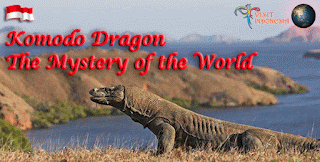It’s located between the islands of Sumbawa and
Flores in the Lesser Sunda Islands, at a distance of 200 nautical miles to the
east of Bali. It has a total land area of 75,000 hectares and encompasses a
number of islands, the largest of which are Komodo (34,000 hectares), Rinca
(20,000 hectares), Padar, Nusa Kode, Motang, numerous
smaller islands, and the Wae Wuul sanctuary on Flores. A total of 112,500
hectares of the surrounding waters are also under the jurisdiction of the park
rangers.
Komodo National
Park has widely known with the home of the giant lizard Komodo
Dragon - which has just declare to be one of the latest
heritage of the world. Explore the under water live and its ecosystems which
has well known as the best diving site in the world. From beautiful coral,
reefs, thousands sort of fishes to the crystal water
and beautiful beach are await to visit. Komodo dragons
live in one of the driest area in Indonesia, where there are few permanent
water sources. The mix vegetation of Komodo National Park provides habitat and
shade for different animals of the park. There are 254
plants species from Asian and Australian origin. Komodo dragons are carnivores
and do not eat any of the vegetation. However, the main prey of Komodo dragon,
such as deer and will boar, feed on various leaves, fruit, flowers, roots and
grasses found in the park.
Most of the Park is
dry, rugged and hilly, a combination of ancient volcanic eruptions and more
recent tectonic uplift of sedimentary seabeds. The irregular coastline is
indented with rocky headlands and sandy bays, many framed by soaring volcanic
cliffs.Komodo island is 35km long and 15km wide, and is mountainous on a north
to south axis, with an average altitude of 500-600m. The highest peak is
Satalibo (735m) in the north. Most of the island is lontar palm savannah with remnates of rainforest and bamboo forest at
higher elevations. On Rinca the land rises gradually
from the north coast to a plateau that ends at Mount Dora (667m) in the south.
The rugged south coast is very sheer as a result of volcanic activity in the
distant past, as evidenced by the crater bay in which Nusa Kode nestles.
Komodo National
Park is a national asset and it has received technical assistance to manage it
to international standards. It has been declared by UNESCO as both a Natural
World Heritage Site and a Biosphere Reserve. This Park is frequently visited by
international tourists, who often describe it as being like another world. Open
plains stretch as far as the eye can see, with the silhouette of occasional fan
palms standing out starkly against a background of mountains.The komodo dragon (varanus komodoensis) is the
largest living lizard in the world, growing over three metres in lenght, with
adults often weighing in excess of 160 kg. The dragon lives only on Komodo and
neighbouring islands. It is a carnivore the feeds on both live prey and
carrion, with their main diet including Sunda deer, wild boar, birds, reptile
eggs and other small animals.
Besides
the Komodo dragon, the Park is also a habitat for deer (Cervus timorensis
floresiensis), wild pig (Sus scrofa), Asian wild dog (Cuon alpinus javanicus),
wild horse (Equus qaballus), wild buffalo (Bubalus bubalis), dugong (Dugong
dugon); 259 species of coral and 1,000 species of fish, 6 species of whale, 10
species of dolphin, as well as turtles and several species of snake, birds and
sharks. The most famous tourist attraction in Flores is Kelimutu; three
coloured lakes in the district of Ende and close to the town of Moni. These crater
lakes are in the caldera of a volcano, and fed by a volcanic gas source,
resulting in highly acid water. The colored lakes change colors on an irregular
basis, depending on the oxidation state of the lake, from bright red through
green and blue. The latest colors (late 2004) were said to be turquoise, brown
and black.
=====o0o=====


















